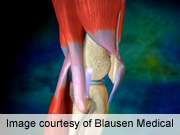(HealthDay)—The addition of gabapentin to patient-controlled analgesia (PCA) protocol does not reduce morphine consumption, pain, or opioid-related side effects in patients undergoing total knee arthroplasty, according to a study published in the Nov. 20 issue of The Journal of Bone & Joint Surgery.
In an effort to examine whether gabapentin reduces morphine consumption, James E. Paul, M.D., from McMaster University in Hamilton, Canada, and colleagues conducted a randomized trial involving 101 patients (mean age, 63 years; 63 percent women) who were receiving total knee arthroplasty. All participants received acetaminophen and intravenous ketorolac two hours before surgery, and after surgery they received PCA morphine for three days, and acetaminophen and ketorolac. In addition, participants were randomized to receive pre- and postoperative gabapentin (52 patients) or placebo (49 patients).
The researchers found that there was no between-group difference in cumulative morphine consumption at 72 hours (66.3 mg in the gabapentin group versus 72.5 mg the placebo group). There was also no difference between the groups in pain scores at rest, with movement, or with weight bearing. In both groups, the incidence of nausea, vomiting, pruritus, dizziness or light-headedness, and visual disturbances was similar. The groups did not differ in the knee range-of-motion at discharge.
"In patients having total knee arthroplasty, the addition of gabapentin to the PCA protocol did not reduce morphine consumption, pain, or opioid-related side effects," the authors write.
More information:
Abstract
Full Text (subscription or payment may be required)
Copyright © 2013 HealthDay. All rights reserved.






















